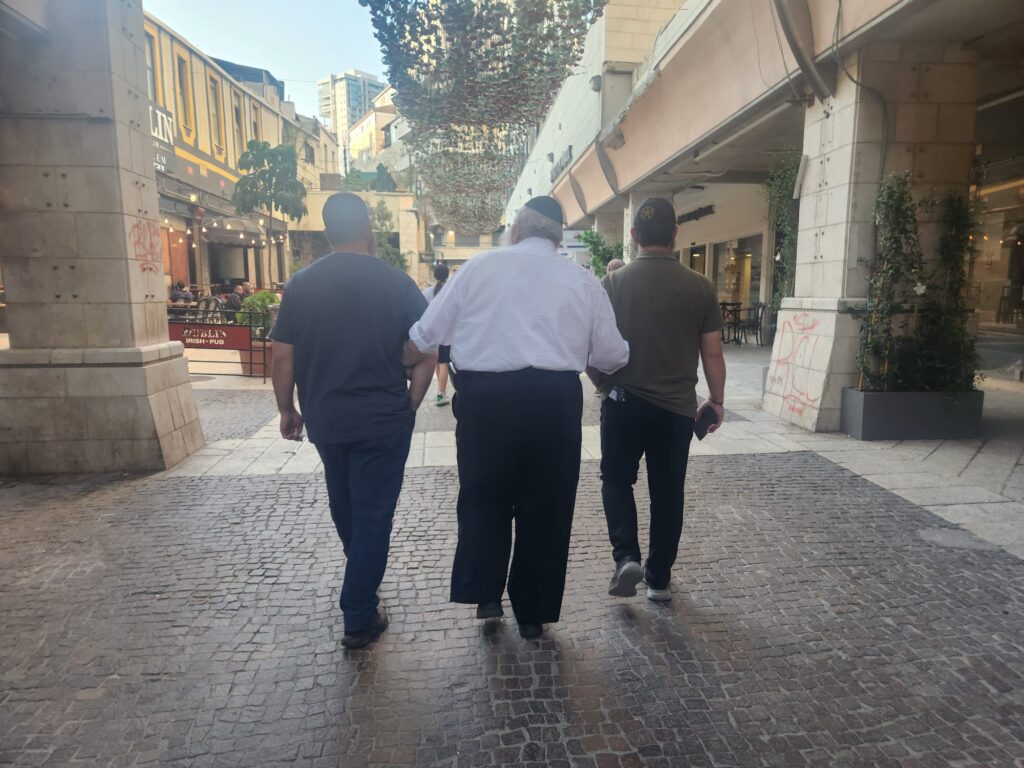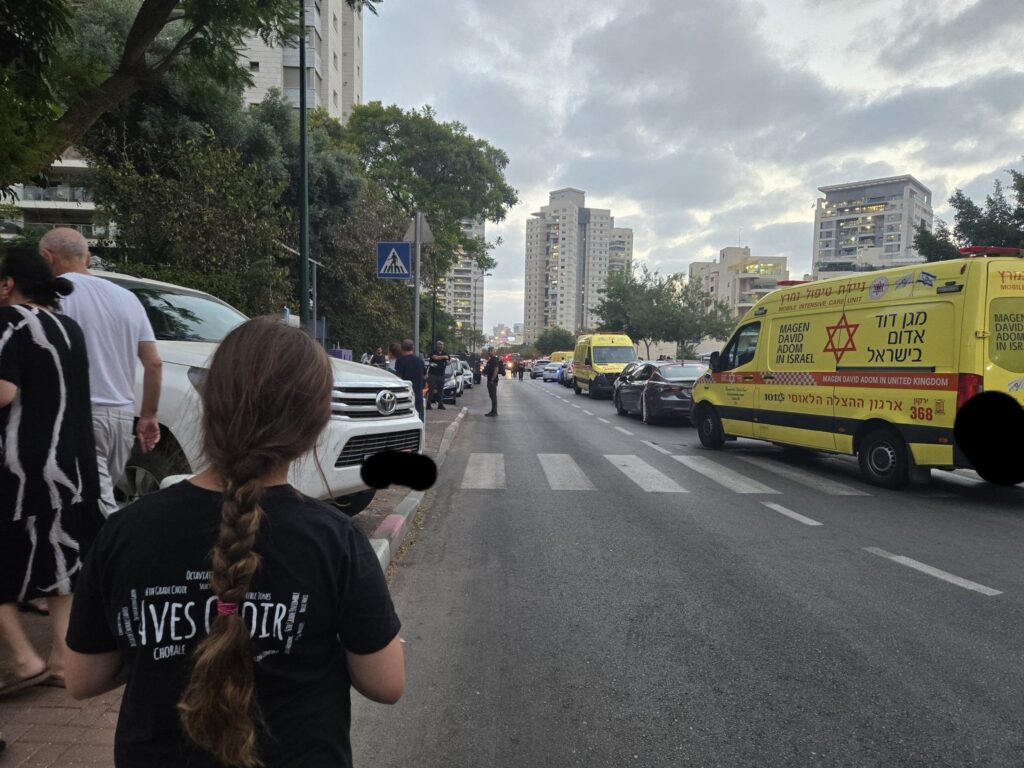On June 13th, Goldy Kalmanson boarded a plane with her family, headed for a wedding in Jerusalem. As their flight neared its destination, the pilot made an unexpected announcement: a “security situation” in Israel. No further details. “Honestly, I was scared,” Kalmanson said. “I just said, ‘G-d help me.’”
She didn’t know it then, but she was flying into history — a moment that would reshape the Middle East and her own life. Israel had just launched Operation Rising Lion, a sweeping air campaign against Iranian military and nuclear targets. Iran responded with days of missile fire, a deadly back-and-forth, lit by the eerie spectacle of interceptors streaking across the sky. Families huddled in shelters as defense systems intercepted rockets midair.
Her plane was rerouted to Cyprus, where they landed with no Wi-Fi, no working cell service, and no clear idea of what would happen next. “My family was freaking out,” Kalmanson said. “We were trying to tell them we were okay.”
In Cyprus, she witnessed a profound moment of unity. “There were two full planes of Jews, just stuck. Over 200 people. And right away, everyone was helping each other,” Kalmanson recalled. She noticed something remarkable: when the crisis hit, labels didn’t matter. “It didn’t matter if you were Orthodox, secular, Dati, or Haredi — no one cared. We were all in it together. It felt like a giant hug from the Jewish people.”
By Friday night, Chabad of Cyprus had transformed into a Shabbat hub, feeding over 440 people. “There were tables everywhere — even next to the preschool playground.” Goldy sat down to dinner with a secular Israeli couple on one side and a Hasid from Monsey on the other.

Kalmanson Family (photo:courtesy)
“We were all Jews. No matter how we lived, how we acted, we were still one big family,” she said. “Everyone was helping each other. No one was alone.”
It was 3 a.m. in Jerusalem when Chana Mangel was jolted awake by the loud, urgent alert on her phone. “We were fast asleep when all our phones lit up,” she said. “Then the sirens started. It was strange because it wasn’t as brief as the other sirens.”
Just a day earlier, Mangel arrived in Israel for a wedding that drew many from the Cincinnati Chabad community. “We asked my daughter, who made aliyah, what was going on, and even she didn’t know,” she said. Hours later, they were huddled in the mamad (safe room), and the alarms kept coming.
By Friday night, 30 of them crowded into their Airbnb for Shabbat dinner. “We sat down to eat, but the alarms went off again. Kiddush wasn’t finished until 10:30 p.m.,” Mangel said. “We didn’t finish dinner until 1 a.m.”
On her walk back to the hotel, Mangel looked up to see Israel’s defense system in action. “I saw the sky light up — the rockets, the interceptors, the booms. It was terrifying, but it was also mesmerizing,” she said. “You almost forget how dangerous it is because it’s so beautiful. You’re watching destruction and protection at the same time. You feel like you’re seeing G-d’s hand in the sky.”
Just as she stood frozen, caught in the spectacle, a security guard rushed over and ushered them into the hotel shelter. “We ended up in the shelter with all the other guests,” she said. Despite the chaos, Mangel found an unexpected sense of unity.
“It was crazy, but at the same time, everyone was Jewish, and everyone was there together,” she said.
In the shelter, Mangel began talking to a mother holding a baby, and they started singing “Shabbat Shalom” together. “It was such a beautiful moment. Even in the midst of fear, there was connection.”
She reflected on the miracle of the Iron Dome. “The fact that there’s an Iron Dome is a gift from Hashem to Israel,” she said. “It feels like G-d’s hand at work, a miracle unfolding right in front of you. You’re in awe of it, so much so that you forget to take cover. It’s breathtaking, watching destruction and protection unfold in the same moment.”
Mangel doesn’t yet know when she’ll return to Cincinnati. “The options are limited and expensive — some people are trying boats or flying through Cyprus or Egypt,” she said. “I saw a form that said ‘Evacuation,’ but I don’t evacuate Israel. If I leave, it’s because I’m going home to see my loved ones.”
It was 3 a.m. in Petach Tikva when the loud, frightening alert on Dikla Karito’s phone startled her awake. With their daughter by their side, Karito and her family quickly gathered essentials — food, clothing, and water — and made their way to the mamad.
Dikla and her husband, Igal, run AD 120, an organization in Cincinnati dedicated to Zionist, family-friendly events. Their trip to Israel had been planned with the hope of connecting with family and fulfilling their mission of supporting Israeli soldiers and their families. But now, as they huddled in the mamad, the reality of the situation settled in. They didn’t know when they would return to Cincinnati. For now, staying close to their family in Israel felt like the right choice.

Observing damage after an Iranian missile strike (photo: courtesy)
The next day, the streets were strangely quiet but not empty — people were walking around, stores were closed, public gatherings prohibited, and yet life still moved forward. “We went out to get what we needed for the weekend, then made sure to be home before dark,” Karito said.
That night, a missile hit a building just four minutes from where they were staying. “My daughter and I were standing near the safe room window when it happened,” she recalled. “The sound was so close, we immediately jumped toward the door in fear.”
At that moment, Karito decided to pack up and head north to be with her parents. “I wanted to be close to them — to help if they needed me,” she said.
Even in the midst of fear and disruption, she remains focused on connection. “People in Cincinnati have been asking how they can help — and it truly means so much. First of all, pray. Don’t underestimate that. And don’t underestimate the power of a message — just a simple text can make all the difference.”
Adam Bellos was in Tel Aviv that night, sitting around a Shabbat dinner table with friends. “It was surreal,” he said. “We were all sitting around joking and drinking wine, and knew that rockets were being launched, that was rather surreal.”
When the sirens finally sounded, they went to the bomb shelter. A friend of his lives next to a building that took a direct hit. “If he hadn’t been in the shelter, he wouldn’t have made it.”
The tension in Tel Aviv is constant, but so is the connection. “Everyone is checking in on each other,” Bellos said. “It’s intense but also weirdly familiar. This is a reality Israelis have lived with for decades.”
As founder of the Israel Innovation Fund, Bellos’s focus has shifted toward media and advocacy, helping international audiences understand what’s unfolding on the ground. “There’s a real economic crisis here. It’s not just about the war. People are losing businesses, homes. It’s deep.”
Bellos’s bigger concern is for American Jews. “Israel will be okay — we’ve been through worse and know how to survive,” he said. “But I worry about Jews in the U.S.—I’m not sure they’re ready for what’s coming.”
His message: Take this seriously. Not just with donations, but with identity. “This is the time to lean into being Jewish — spiritually, emotionally, physically. The world is changing, and we need to be ready.”
These Cincinnatians didn’t just watch history unfold; they lived it. And now, they’re coming home with more than just stories — they’re bringing back a new understanding of what it means to be part of something larger, to be one with Israel and with each other.
For those of us in Cincinnati, this is a reminder: it’s not enough to wait for change. Now is the time to act — to show up for our community in Israel, to stand with the Jewish community at home, and to live out our shared identity wherever we are. These Cincinnatians have lived through history, and as they return home, they remind us that we, too, are part of this moment. Our actions today — big or small — will resonate, shaping the future we’re writing together.
